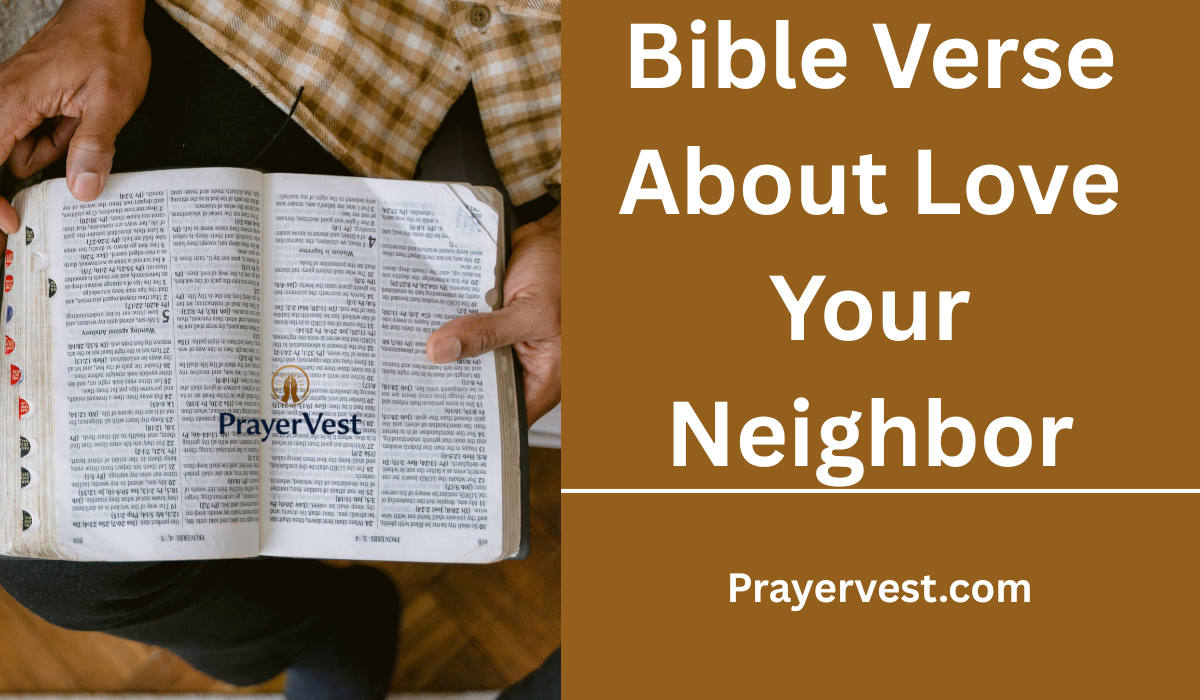The mandate to “love your neighbor as yourself” is one of the clearest expressions of love, which is the lifeblood of Christianity. This divine guidance, which has its roots in both the Old and New Testaments, transcends religious customs, cultural boundaries, and individual preferences.
It is a timeless summons to empathy, compassion, and action, which Jesus Himself confirmed is the second most important imperative after loving God. The exhortation to love our neighbors challenges believers to adopt a radical, countercultural lifestyle in a culture that is frequently characterized by division and self-interest.
It’s simple to restrict the definition of “neighbors” to people who live next door or who hold comparable values and beliefs. However, this term is greatly expanded in the Bible. The outsider, the outcast, the enemy, or anybody else in need of justice and kindness can all be considered our neighbors.


Scripture pushes us to extend love outside of our comfort zones and into places of inconvenience, humility, and vulnerability through parables like the Good Samaritan and direct teachings from Christ and the apostles. Loving one’s neighbor is a hallmark of Christian maturity, not just a suggestion.
We come across scriptures that give form to this demand throughout the Bible, demonstrating not just how to love but also why it is important. These verses shed light on the characteristics of godly love, which include patience, generosity, forgiveness, and truthfulness. Our connections become conduits for God’s grace as we concentrate on Bible passages about loving our neighbors, opening our hearts to the Holy Spirit’s transformational activity. By doing this, we show the world, which is watching and hurting, the very essence of Christ.
40 Powerful Bible Verse About Love Your Neighbor (2026)
1. Leviticus 19:18
“Do not seek revenge or bear a grudge against anyone among your people, but love your neighbor as yourself. I am the Lord.”
This foundational commandment from the Old Testament encapsulates God’s heart for relational harmony and communal respect. Rather than allowing bitterness or retaliation, God calls His people to love one another with the same regard they hold for themselves. It emphasizes that love must transcend hurt and offense. This divine instruction is not only a moral guideline but a reflection of God’s character. Loving your neighbor is not just a good idea—it is an act of obedience to the Lord Himself.
2. Matthew 22:39
“And the second is like it: ‘Love your neighbor as yourself.’”
When Jesus summarized the Law, He highlighted love as its very essence—first to God, then to others. This verse links vertical devotion with horizontal compassion, insisting that love for neighbor is inseparable from love for God. By putting others on equal footing with ourselves, Jesus teaches a selfless, empathetic kind of love. It challenges us to treat others with the same care, understanding, and dignity we wish for ourselves. True discipleship manifests not only in belief but in behavior toward those around us.
3. Romans 13:10
“Love does no harm to a neighbor. Therefore love is the fulfillment of the law.”
Paul underscores that genuine love is not merely emotional or verbal—it is active, ethical, and protective. In fulfilling the law through love, we naturally avoid causing harm, deceit, or injustice to others. This kind of love is not passive tolerance, but a powerful force that guards the well-being of others. It compels us to walk in integrity, peacemaking, and kindness. When love leads, laws are no longer a burden—they become a natural byproduct of a heart aligned with God’s will.
4. Galatians 5:14
“For the entire law is fulfilled in keeping this one command: ‘Love your neighbor as yourself.’”
Paul distills the complexities of religious law into one transformative command: love your neighbor. This verse reveals the liberating simplicity of Christian ethics. Love becomes the governing force for moral and spiritual life. It replaces rigid legalism with relational compassion. If we love others with genuine care and respect, every other command—against lying, stealing, coveting, or harming—naturally falls into place. Love is not a weak or vague sentiment; it is the powerful principle upon which God builds His kingdom.
5. Luke 10:27
“He answered, ‘Love the Lord your God with all your heart and with all your soul and with all your strength and with all your mind’; and, ‘Love your neighbor as yourself.’”
In response to Jesus’ question, a teacher of the law recites the two greatest commandments, rightly linking devotion to God with compassion for others. This holistic love involves every aspect of our being—emotions, spirit, body, and intellect—and overflows into how we treat those around us. It reveals that love is not compartmentalized; it is comprehensive and connected. Loving your neighbor is the visible fruit of truly loving God. It transforms not just individuals, but entire communities.
6. James 2:8
“If you really keep the royal law found in Scripture, ‘Love your neighbor as yourself,’ you are doing right.”
James refers to loving your neighbor as the “royal law” because it reflects the character of Christ, the King. This verse serves as both encouragement and accountability. To love our neighbor is to walk in royal, God-honoring obedience. It transcends status, background, or preference, calling us to love all people equally. James reminds us that partiality, favoritism, or discrimination contradict the core command of love. Living out this royal law brings both personal righteousness and social justice into harmony.
7. 1 John 4:20
“Whoever claims to love God yet hates a brother or sister is a liar. For whoever does not love their brother and sister, whom they have seen, cannot love God, whom they have not seen.”
This verse delivers a convicting truth: our love for God is evidenced by how we treat others. John dismantles the idea of hidden holiness by insisting on tangible love. If we harbor hatred, resentment, or neglect toward others, our claimed devotion to God is exposed as false. Love must be visible, practical, and genuine. True spirituality does not bypass human relationships; it is proven through them. We cannot say we know God if we fail to reflect His love toward our neighbors.
8. Proverbs 3:29
“Do not plot harm against your neighbor, who lives trustfully near you.”
This proverb emphasizes the importance of trust, peace, and moral responsibility in our relationships. God expects us to protect—not exploit—those who dwell near us. When someone lives trustfully beside us, any betrayal is not just personal but deeply spiritual. This verse calls us to safeguard the dignity, security, and well-being of our neighbor. Love includes restraint, honor, and respect. Choosing peace over deceit reflects the heart of a person who fears God and values community.
9. 1 Corinthians 13:4-5
“Love is patient, love is kind. It does not envy, it does not boast, it is not proud. It does not dishonor others, it is not self-seeking, it is not easily angered, it keeps no record of wrongs.”
Paul gives a vivid picture of what love looks like in everyday interactions. This passage isn’t just for weddings—it is a blueprint for loving your neighbor. Love is an active, deliberate choice to be kind, humble, forgiving, and patient. It resists selfishness and makes space for reconciliation. If we truly embody this kind of love, we become agents of healing and unity in a divided world. Our neighbors experience the gospel not just in words, but in how we treat them.
10. Zechariah 7:9-10
“This is what the Lord Almighty said: ‘Administer true justice; show mercy and compassion to one another. Do not oppress the widow or the fatherless, the foreigner or the poor.’”
God’s vision for neighborly love includes justice, mercy, and active concern for the marginalized. In this prophetic call, love is expressed through tangible acts—defending the weak, supporting the needy, and refusing to exploit the vulnerable. These verses challenge us to go beyond sentiment into action. Loving our neighbor means aligning with God’s concern for the outcast and the oppressed. It’s a call to build communities marked by fairness, care, and empathy.
11. Luke 6:31
“Do to others as you would have them do to you.”
Often referred to as the “Golden Rule,” this teaching from Jesus sets a powerful standard for neighborly love. It calls us to imagine ourselves in others’ situations and to treat them with the dignity, grace, and kindness we would hope to receive. This proactive ethic reshapes how we approach relationships, not based on others’ actions, but on divine love. It makes love not a reaction, but a way of life. When practiced sincerely, this rule becomes a revolutionary force for good.
12. Romans 15:2
“Each of us should please our neighbors for their good, to build them up.”
This verse highlights the edifying nature of love. Paul encourages believers to live with a selfless posture that strengthens others rather than serving personal gain. Loving your neighbor involves encouragement, support, and sacrifice. It means being mindful of others’ growth, comfort, and spiritual well-being. In a world consumed by self-interest, choosing to build others up is a testimony of Christlike maturity and an embodiment of the gospel’s call to serve.
13. Hebrews 13:1-2
“Keep on loving one another as brothers and sisters. Do not forget to show hospitality to strangers…”
The writer of Hebrews urges the community to maintain brotherly love and to extend that love even to strangers. This is a reminder that neighborly love isn’t limited to people we know or feel comfortable around—it stretches outward. Hospitality becomes an expression of divine love, where welcoming others may even entertain angels unaware. Love that goes beyond convenience reflects the boundless love of God, who welcomed us while we were strangers to His grace.
14. Matthew 5:43-44
“You have heard that it was said, ‘Love your neighbor and hate your enemy.’ But I tell you, love your enemies and pray for those who persecute you.”
Jesus radically redefines what it means to love one’s neighbor by removing the boundary of friendship and including enemies. This teaching challenges us to extend grace where it’s hardest, to forgive where it’s undeserved, and to pray for those who hurt us. In doing so, we reflect the very heart of God, who loved us even while we were sinners. True neighborly love sees past wounds and offenses and chooses mercy over vengeance.
15. Ephesians 4:2
“Be completely humble and gentle; be patient, bearing with one another in love.”
Paul lays out the attitudes that sustain unity and neighborly care: humility, gentleness, patience, and loving endurance. These virtues serve as the foundation for healthy relationships, both in the church and the broader community. Loving your neighbor requires emotional strength and spiritual maturity—it’s not always easy. But when we choose to bear with others, even in difficulty, we make space for healing, connection, and peace.
16. Philippians 2:3-4
“Do nothing out of selfish ambition or vain conceit. Rather, in humility value others above yourselves, not looking to your own interests but each of you to the interests of the others.”
Paul challenges believers to flip the cultural narrative of self-promotion and embrace humility. Loving your neighbor means laying down pride and choosing to consider their needs as important as your own. This posture isn’t about losing your worth—it’s about lifting others up in a way that reflects Christ’s sacrificial love. When practiced in communities, this kind of love creates unity, harmony, and lasting peace.
17. John 15:12
“My command is this: Love each other as I have loved you.”
Jesus sets the gold standard for neighborly love—His own example. He doesn’t just tell us to love; He shows us what that love looks like: selfless, sacrificial, unwavering. This verse turns love from a vague idea into a sacred command. It calls us to model the patience, compassion, and endurance that Christ displayed. Loving others as Jesus did means stepping into hard spaces and giving even when it costs something.
18. Colossians 3:13-14
“Bear with each other and forgive one another… And over all these virtues put on love, which binds them all together in perfect unity.”
Paul highlights forgiveness and love as the glue that holds communities together. Bearing with one another is not a passive tolerance but a patient and gracious way of doing life together. Love doesn’t erase differences—it unites them. When love is our highest virtue, it binds patience, kindness, humility, and forgiveness into a beautiful harmony that glorifies God and blesses those around us.
19. Proverbs 17:17
“A friend loves at all times, and a brother is born for a time of adversity.”
This verse emphasizes the constancy and reliability of true love. Whether we are biological relatives or chosen friends, loving one another through thick and thin is a powerful testimony. Adversity reveals the depth of our love and commitment. When we love our neighbors well, we become the steady presence they can lean on in times of sorrow, fear, or need. Our love becomes a shelter in life’s storms.
20. 1 Peter 4:8
“Above all, love each other deeply, because love covers over a multitude of sins.”
Peter reminds believers that love isn’t surface-level—it must be deep, sincere, and enduring. This kind of love is redemptive; it doesn’t ignore sin, but it responds with grace and compassion. In a world prone to judgment and division, deep love builds bridges and fosters healing. Loving your neighbor means seeing past faults and choosing mercy. It reflects God’s love, which covers our sins through Christ.
21. Job 6:14
“Anyone who withholds kindness from a friend forsakes the fear of the Almighty.”
Job points to the sacred connection between kindness and reverence for God. When we neglect compassion, especially toward those close to us, we not only harm relationships—we dishonor the God who created those relationships. This verse reminds us that kindness is more than politeness; it is a spiritual act. Withholding love or support from a neighbor reflects a heart disconnected from the fear of the Lord. To fear God rightly is to love people deeply.
22. Zechariah 8:16-17
“Speak the truth to each other, and render true and sound judgment in your courts; do not plot evil against each other, and do not love to swear falsely. I hate all this,” declares the Lord.
God’s vision for community is built on truth, justice, and moral integrity. Loving your neighbor goes beyond personal emotion—it requires ethical action. Speaking truthfully, acting justly, and avoiding deception are acts of love that create peace and safety. These commands show that love is not vague or sentimental—it’s practical, public, and rooted in righteousness. God desires communities where love is demonstrated in both heart and action.
23. 1 John 3:17-18
“If anyone has material possessions and sees a brother or sister in need but has no pity on them, how can the love of God be in that person?… let us not love with words or speech but with actions and in truth.”
John delivers a sharp and stirring call to active love. It’s not enough to say we care—we must show it, especially when needs are visible. Real love is not performative or convenient; it’s sacrificial, generous, and rooted in truth. Our treatment of neighbors, especially the vulnerable, reflects whether God’s love truly dwells in us. The church is called to be the hands and feet of Jesus, meeting real needs with real compassion.
24. Luke 10:36-37
“Which of these three do you think was a neighbor to the man who fell into the hands of robbers? The expert in the law replied, ‘The one who had mercy on him.’ Jesus told him, ‘Go and do likewise.’”
In this conclusion to the parable of the Good Samaritan, Jesus reframes “neighbor” not as a label, but as a lifestyle. The Samaritan, once viewed as an outsider, becomes the true neighbor through his mercy. Jesus calls us to imitate this radical compassion. Neighborly love is not about who is near you by geography, race, or religion—it’s about who needs your mercy. “Go and do likewise” is a divine commission to live mercifully, even when it’s inconvenient or uncomfortable.
25. Proverbs 14:21
“It is a sin to despise one’s neighbor, but blessed is the one who is kind to the needy.”
This proverb brings clarity to the moral seriousness of how we treat others. Despising a neighbor—through scorn, neglect, or indifference—is sin in God’s eyes. In contrast, kindness, especially to the needy, brings blessing. This reveals that love isn’t optional; it’s a spiritual obligation with real consequences. To walk in love is to walk in the favor and blessing of God, who cares deeply for every person, especially the poor and vulnerable.
26. Micah 6:8
“He has shown you, O mortal, what is good. And what does the Lord require of you? To act justly and to love mercy and to walk humbly with your God.”
This beloved verse encapsulates the essence of neighborly love. Justice, mercy, and humility form the bedrock of how we should live with others. God doesn’t demand complex rituals—He desires hearts that love rightly and live humbly. Loving your neighbor means standing up for justice when it’s needed, extending mercy when it’s hard, and living without arrogance. These actions reveal a heart aligned with God’s purpose and presence.
27. 1 Thessalonians 5:11
“Therefore encourage one another and build each other up, just as in fact you are doing.”
Paul’s encouragement to the Thessalonians reveals that love is uplifting. Encouragement is not just flattery—it’s a spiritual gift we give our neighbors to strengthen them. In a world full of criticism and despair, we are called to be builders, not breakers. Love builds others up—through words, actions, and presence. A community that consistently encourages one another reflects the heart of Christ, who never tears down but always restores.
28. Galatians 6:2
“Carry each other’s burdens, and in this way you will fulfill the law of Christ.”
To love your neighbor is to share their weight. Burden-bearing is not just compassionate—it’s Christlike. This verse invites us into the sacred ministry of empathy, where we step into another’s pain not to fix everything, but to walk with them. The law of Christ—the law of love—is fulfilled not through mere words but through shared suffering and support. Our willingness to carry each other’s burdens is proof of authentic community.
29. Isaiah 1:17
“Learn to do right; seek justice. Defend the oppressed. Take up the cause of the fatherless; plead the case of the widow.”
Isaiah calls for active, justice-centered love that defends and protects the vulnerable. Loving your neighbor means advocating for those who can’t speak for themselves—orphans, widows, the oppressed. It’s a love that gets involved, takes risks, and pursues righteousness. This verse reminds us that spiritual devotion without social responsibility is incomplete. God’s people are meant to reflect His justice and compassion in a broken world.
30. Ephesians 4:32
“Be kind and compassionate to one another, forgiving each other, just as in Christ God forgave you.”
Paul calls believers to model their love after Christ’s forgiveness. Kindness and compassion are not suggestions—they’re imperatives rooted in our own redemption. Forgiveness is often the hardest form of love, but it is also the most divine. When we choose to forgive and show mercy, we reflect the heart of God to those around us. Our relationships become places of healing rather than hurt, of restoration rather than resentment.
31. Matthew 7:12
“So in everything, do to others what you would have them do to you, for this sums up the Law and the Prophets.”
Jesus reaffirms the foundational principle of love and reciprocity. Known as the Golden Rule, this verse emphasizes proactive kindness—doing, not just feeling. It places responsibility on each believer to treat others with the same dignity, patience, and care we desire for ourselves. This simple yet profound command wraps up the essence of the entire Old Testament. Loving your neighbor begins by imagining yourself in their shoes and acting with sincere compassion.
32. 1 John 3:10
“Anyone who does not do what is right is not God’s child, nor is anyone who does not love their brother and sister.”
John draws a stark distinction between those who belong to God and those who do not—and love is the key marker. If we neglect righteousness and fail to love others, we contradict our claim to be children of God. This verse serves as a spiritual litmus test. Love is not an optional accessory to faith—it’s the defining evidence. Our love for others is the visible fruit of an invisible relationship with God.
33. Proverbs 25:21
“If your enemy is hungry, give him food to eat; if he is thirsty, give him water to drink.”
This radical proverb invites us into a higher way of love: caring for enemies. By extending kindness to those who oppose us, we mirror the unexpected, grace-filled nature of God. This kind of love disarms conflict, heals wounds, and opens hearts. Loving your neighbor isn’t limited to friends or allies—it includes those who challenge us. Mercy toward enemies is one of the most powerful testimonies of Christlike love.
34. Romans 12:10
“Be devoted to one another in love. Honor one another above yourselves.”
Paul calls believers to a deep level of commitment in their relationships. Devotion speaks of loyalty, consistency, and sacrifice. Honoring others means lifting them up, celebrating their worth, and prioritizing their needs. When we live this way, we create a community marked by mutual respect and enduring love. Loving your neighbor becomes an act of intentionality, where every action reflects the value God has placed on them.
35. Mark 12:31
“The second is this: ‘Love your neighbor as yourself.’ There is no commandment greater than these.”
Jesus reiterates that loving your neighbor is second only to loving God—and inseparably linked to it. This command is not supplementary; it’s central. All of God’s moral law flows through this lens. It’s a call to view every person through the eyes of grace, dignity, and selfless love. The weight of this command shapes our relationships, communities, and witness to the world. Love is not just the greatest—it’s the command that makes everything else meaningful.
36. 2 Corinthians 13:11
“…encourage one another, be of one mind, live in peace. And the God of love and peace will be with you.”
Paul encourages unity, peace, and mutual support as hallmarks of a loving Christian community. Encouraging others, seeking unity, and promoting peace are all expressions of neighborly love. This verse is a reminder that God’s presence dwells richly where love and harmony abound. When we love our neighbors well, we become places where the God of peace is welcomed and glorified.
37. Leviticus 19:34
“The foreigner residing among you must be treated as your native-born. Love them as yourself, for you were foreigners in Egypt. I am the Lord your God.”
This command highlights God’s heart for inclusion and compassion. Loving your neighbor includes the outsider, the immigrant, and the marginalized. God reminds Israel of their own past to stir empathy and action. The call is clear: treat the foreigner as family. This verse expands the scope of neighborly love to include those different from us—breaking down walls of fear and prejudice with bridges of compassion.
38. John 13:34
“A new command I give you: Love one another. As I have loved you, so you must love one another.”
Jesus calls His followers to a new standard of love—His own example. This love is more than duty; it’s divine. It includes washing feet, bearing burdens, forgiving betrayals, and even dying for others. The love Jesus modeled is self-sacrificing and unconditional. When we love others in this way, we become living testimonies of Christ to the world. Neighborly love is not based on feelings, but on following the way of the cross.
39. Titus 3:2
“…to slander no one, to be peaceable and considerate, and always to be gentle toward everyone.”
Paul instructs believers to show gentleness, avoid slander, and pursue peace with everyone—not just with those they like. Loving your neighbor includes guarding your words, extending courtesy, and striving for kindness even in disagreement. In a world full of division, this gentle posture stands out. It invites others into the peace of Christ through relational warmth and integrity.
40. Matthew 25:40
“Truly I tell you, whatever you did for one of the least of these brothers and sisters of mine, you did for me.”
Jesus reveals that acts of love toward others—especially the marginalized—are received as acts done to Him. This verse transforms how we see our neighbors: not as burdens, but as sacred opportunities to serve Christ Himself. Whether feeding the hungry, visiting the sick, or welcoming the stranger, every gesture becomes worship. Loving your neighbor becomes a holy, eternal investment in the kingdom of God.
Conclusion
The biblical exhortation to love our neighbor is still a daring and transforming demand in a society that frequently places a higher priority on division and self-interest. These scriptures are divine calls to carry out the love of Christ in real, practical ways, not idealistic abstractions. We can reflect God’s heart and create bridges where walls once existed by loving our neighbors, whether that be via deeds of kindness, words of encouragement, or forgiveness. This type of love can restore relationships, bring people together, and make God’s kingdom more visible in our day-to-day existence.
We start to realize that loving our neighbor is an act of worship rather than merely compliance as we reflect on these Bible passages and apply them to our interpersonal interactions. Our lives become manifestations of God’s grace, and our faith is made evident by this love. May God’s love light through us into every part of the world, challenging and inspiring each of us to walk in love, not just in words, but in truth and deeds.






